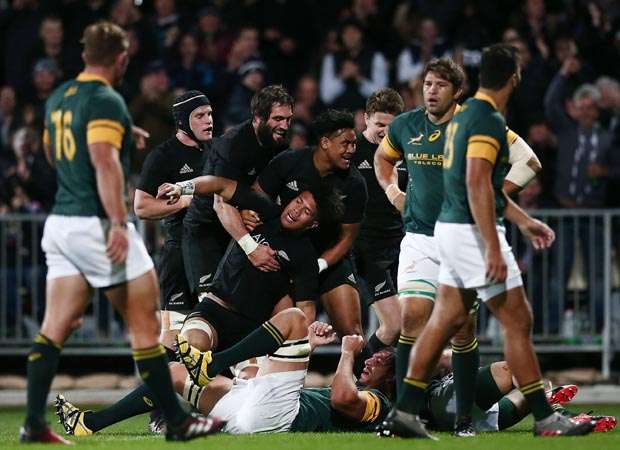
However, if there is one team that does not, in the words of the immortal Beatles song “need a little help from their friends” when it comes to being street-wise and stretching the laws beyond their limits, it is the double world champions. And yet, they are the recipients of not just a little help from match-officials, but an overflowing charitable fund.
In this edition of a Southern Hemisphere Rugby Championship in which, so far, the All Blacks have gone through their opponents like a dose of salts, it appears that referees, their assistants, and TMOs are queueing up to pay homage to them. As Eddie Jones has remarked, New Zealand rule the rugby world in most respects, including having more admirers among World Rugby‘s elite match officials than is good for the game. And it shows. Repeatedly.
It is imperative that international match officials – who are well-paid professionals – remain objective and impartial in their treatment of all teams. Yet, the regularity with which they have ignored and waved through All Black infractions during the Rugby Championship, often tipping the scales in New Zealand’s favour when matches are in the balance, is in grave danger of undermining their credentials and credibility.
Steve Hansen and his squad have been lauded for their excellence, with the plaudits raining down from all sides. Much of it is well deserved, because New Zealand are playing with a speed of thought and execution in attack which is unrivalled. Their suffocating defensive press is almost as impressive, although like many of the best defences it habitually pushes the offside line past breaking point.
However, as the wily Hansen concedes, the All Blacks are not perfection incarnate. And that probably goes a long way to explaining the frequency with which they use blocking runners to obstruct defenders, and forward passes to break the gain-line.
The idea that the All Blacks are being allowed to play to a different rule book is also evident on the disciplinary front, where New Zealand tight-head Owen Franks recently escaped scot-free despite a similar hands-near-eyes infringement to those that last season earned lengthy bans for Chris Ashton (ten weeks) and Mario Galarza (nine weeks).
Where Argentine lock Galarza missed the entire 2015 World Cup after his hands came into contact with New Zealand lock Brodie Retallick’s eyes during their opening game of the tournament, Franks mysteriously managed to escape being carded, or cited, despite having his hands in contact with Australian lock Kane Douglas’ eyes during a line-out in Wellington.
Although Argentina‘s world rugby vice-chairman Agustin Pichot has raged against the inconsistency shown by match-officials, the reality is that where most players from most countries would have been summarily sin-binned, Franks stayed on the field after the sixth minute incident.
The advantages of match-official blindness to New Zealand infractions are clear to see in any objective analysis of their recent games – in most of which they have enjoyed home advantage. With New Zealand leading Australia 10-6 in Wellington the hosts pulled clear with a try when centre Malakai Fekitoa made a blocking run in front of Beauden Barrett which impeded three Wallabies from being able to tackle the fly-half.
The main man responsible for defending the channel was Samu Kerevi, who tripped after making contact with Fekitoa. This allowed Barrett to race through a huge gap and give Israel Dagg a scoring pass for a 15-6 lead. New Zealand did not look back – and nor did the referee, or the TMO.
Next came Argentina, who rattled New Zealand with a spirited first-half performance in Hamilton. Just after the interval New Zealand led 24-22, but were fortunate to have an advantage of any sort after being awarded two highly questionable tries by referee Craig Joubert.
The first of these, scored by Julian Savea, was created by a blatant blocking run by centre Ryan Crotty which opened the gap for the winger by obstructing his Argentine opposite number, Juan-Martin Hernandez, from making a tackle. The second NZ try saw Fekitoa tackled to the ground in the build-up, after which he placed the ball back and released it. Then, off his feet in a prone position, Fekitoa played the ball off the ground illegally, flicking it up to a support runner, with the move ending in a try for Ben Smith.
To add insult to injury, Crotty’s try in the 53rd minute – which proved decisive as it gave New Zealand a 31-22 advantage – was also awarded after lax refereeing. Although Barrett made a couple of brilliant attacking runs, when the second finished with a pass out of the tackle to Crotty which looked more forward than flat, it was crying out for referral to the TMO.
Instead, with the Pumas handicapped severely by poor refereeing, and an All Black side which had taken full advantage to get on a roll, the match went from being highly competitive to one-way traffic.
Last but not least was the 55th minute try awarded to Ardie Savea which swung last weekend’s match against South Africa in Christchurch decisively in New Zealand’s favour. With the All Blacks leading 22-13 the Springboks were hit by a trio of officiating howlers which ended in an unjustifiable try.
In the build-up French assistant referee Patrice Gauzere failed to see that Julian Savea had nudged the ball forward when he hit the ground after being tackled. If that was acceptable human error, Matt Todd’s blocking run later in the move, which obstructed Tendai Mtawarira and sent Aaron Smith racing into the Springbok 22, was virtually unmissable. This resulted in Smith pulling the younger Savea over.
Yet, even though it had New Zealand TV commentator Justin Marshall calling for the try to be disallowed, Australian referee Angus Gardiner had the blinkers on. The refereeing farce continued when replays showed that Savea had failed to ground the ball after being tackled by Faf du Klerk and Eben Etzebeth.
At that point Grant Nesbitt, Marshall’s notoriously one-eyed colleague, asked “did that hit the grass?”. Marshall’s response was a weary,”I don’t even want to go into that”.
World Rugby referees boss Alain Rolland does not have that luxury. The reality is that New Zealand are not at fault because they do not referee themselves – and it is Rolland’s duty to make sure that elite match officials remain impartial and stop worshipping at the All Black altar.
























